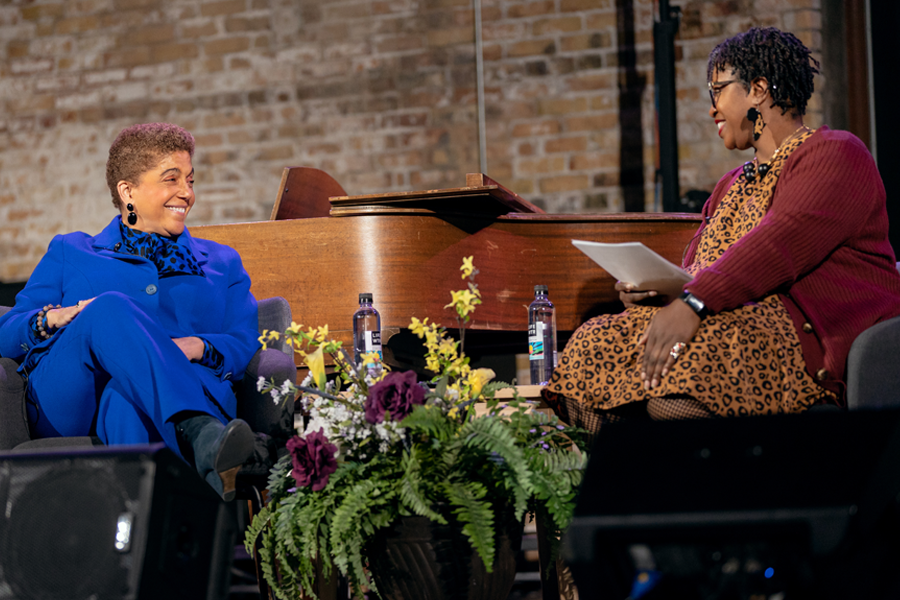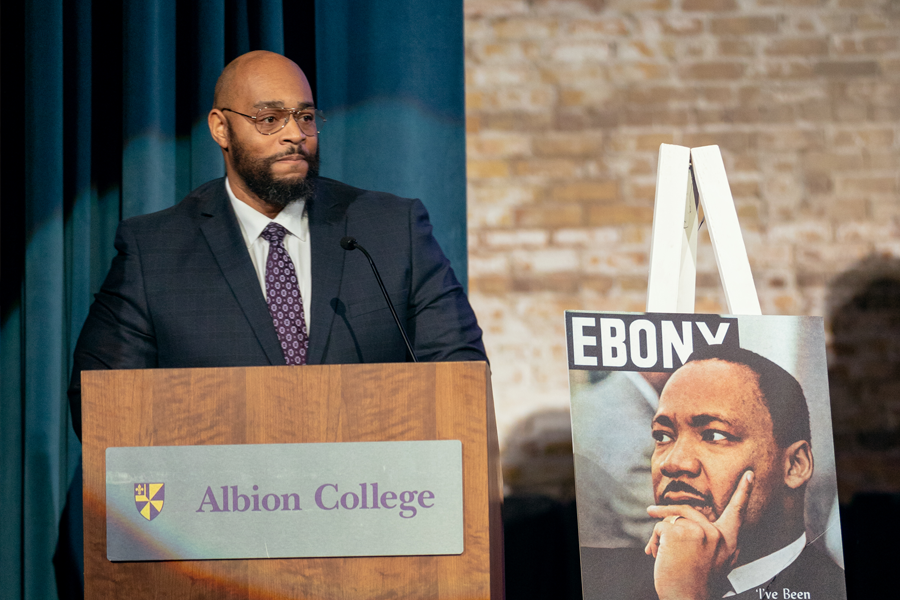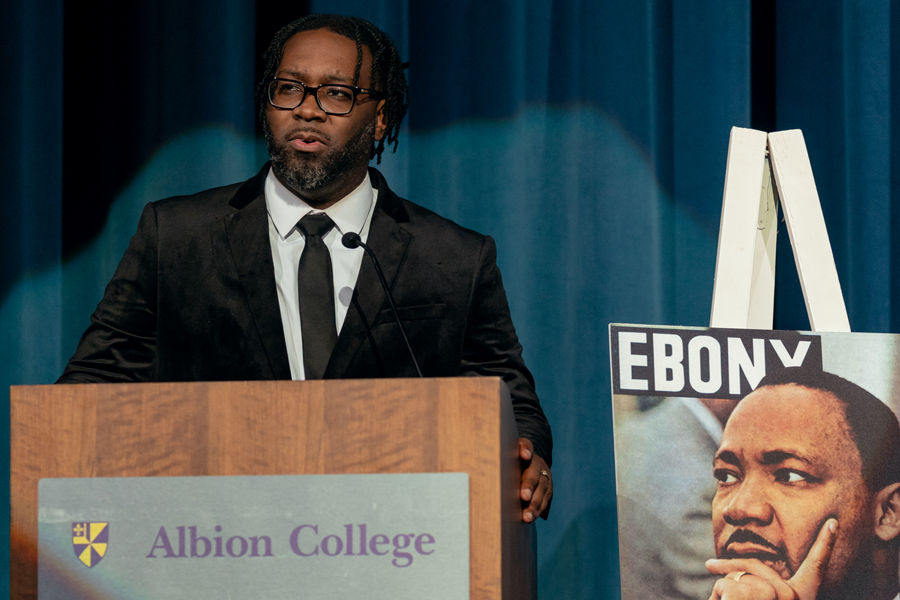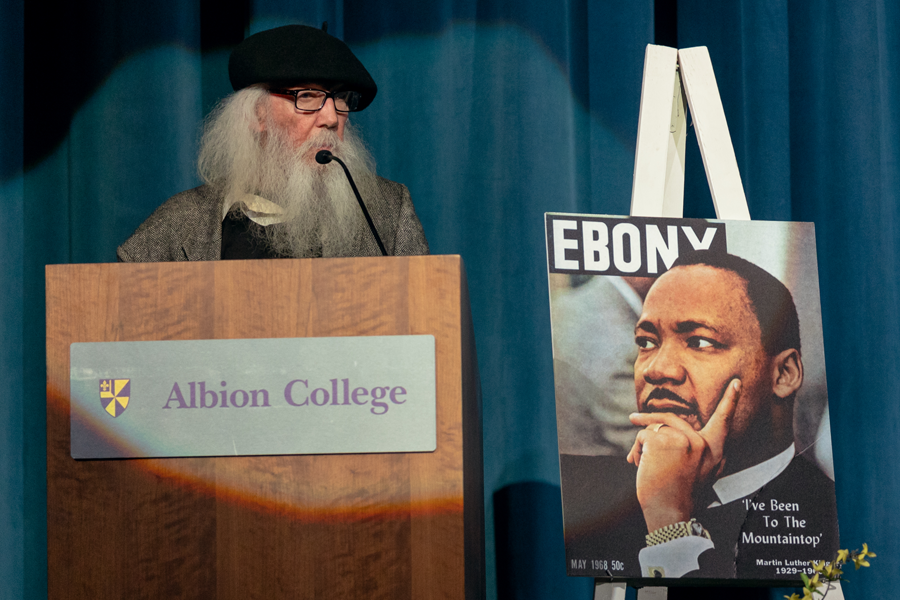Albion community celebrates MLK legacy with Linda Johnson Rice
The MLK Convocation shared timely wisdom and offered historical perspective on the pivotal role of Black-owned media in shaping the cultural climate.
January 31, 2024
Albion College and the greater Albion community came together on Monday, Jan. 22, to commemorate the life and legacy of Rev. Dr. Martin Luther King, Jr.
A vibrant audience filled the historic Bohm Theatre in downtown Albion for a conversation with Linda Johnson Rice, Chairman and CEO of Johnson Publishing Company (JPC) and former Chairman Emeritus of Ebony Media Operations. Her participation was a highlight of the annual Rev. Dr. Martin Luther King, Jr. Convocation.
Johnson Rice is a visionary leader known for managing the largest African American publishing company in the world and building global brands. Her influence spans business and editorial, from planning the strategic direction of the global beauty brand for women of color, Fashion Fair Cosmetics, to setting the tone of the heritage magazines, EBONY and Jet. She also currently serves on several corporate and nonprofit boards.
During the hour-long event, Johnson Rice fielded questions from Jiquanda Johnson, founder and editor of Flint Beat, who served as the event moderator. Albion students also engaged with Johnson Rice on the theme, “Shifting the Cultural Climate Through the Study and Practice of Kingian Nonviolence.”
Her insights highlighted the indispensable role played by EBONY and Jet magazines in disseminating Black narratives and portraying a diverse Black identity and culture throughout the late 20th century.
“My father really had his finger on the pulse of what was going on [in Black communities] because he was talking to people of all walks of life all the time,” said Johnson Rice. “We also had what were called ‘stringers’ – writers all across the country and especially in small towns – because that is where you got a sense of what was going on in their world. It was really important to get all of this information from all across the country from small places as well. It wasn’t just what happened in Chicago, or New York, or Atlanta.”
Johnson Rice emphasized the ongoing relevance of Black media, stating, “I think Black media today is more crucial and is needed more than ever. Whether it’s in a magazine, like EBONY, whether it’s social media, whether it’s in online commentaries, or chat rooms, or social groups—you’ve got to have that perspective and it’s got to come from us.” She stressed the importance of ownership and the necessity for Black perspectives in various media outlets.
In addition to discussing the past impact of EBONY and Jet, Johnson Rice urged the audience to recognize the strength of Black individuals and communities. She emphasized the significance of using their voices through voting, despite the challenges faced.
“I think we also need to understand the strength that Black people have, individually and collectively. And we need to use that strength in our voice to vote. I’m always telling young people, don’t be discouraged, don’t be disillusioned by what you see. It’s rough out here. It is rough out here. But the only way to make those changes is for you to have a voice and to have a vote. Please don’t sit on your hands.”
A lover of books and the current president of the Chicago Public Library Board of Directors, Johnson Rice also urged the audience to seek truth in the media they consume. “As we move in this digital age and gather information, we must gather information that is the truth and not just absorb things and take them at face value,” she explained. “It’s so important that what you read and what you absorb and try to understand is really true. I know a lot of media is fast media—and I’m all for that—but I’m also for accuracy.”
Beyond being publications, EBONY Magazine captured the post-war optimism and aspirational dreams of multiple generations of African Americans. Notably, from 1957 to 1958, Martin Luther King Jr. contributed a monthly advice column called “Advice for Living.”
Founded in 1945 and 1950, EBONY and Jet transitioned to digital formats in 2021 and 2014, respectively, a move Johnson Rice deemed necessary for the digital age.
The evening featured performances by the Albion College Concert Choir and gospel singer Pastor David Warnsley. Rev. Jacques Harris of Bethel Missionary Baptist Church delivered the invocation, and local NAACP representative and Albion College Trustee, Mae Ola Dunklin, made offerings. Dr. Taran McZee, vice president for belonging, provided brief remarks.
Attendees expressed gratitude for an inspiring and reflective night, with Albion College continuing the celebration throughout February with a special “EBONY: Centering Blackness Throughout History” photo exhibit in the Kellogg Center. Sixteen covers were selected to showcase the diversity of African American life over the decades.




